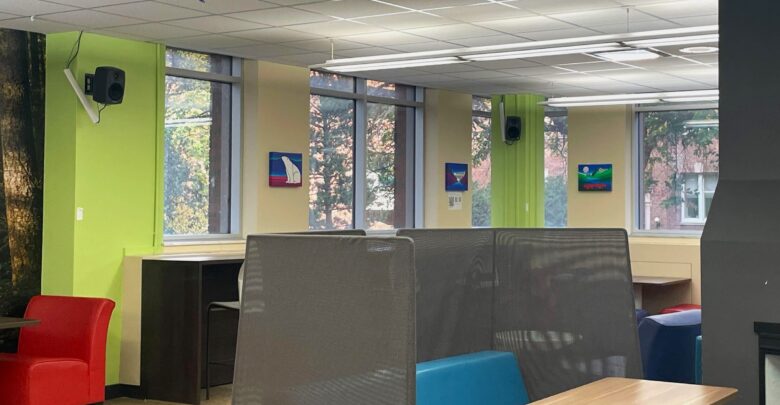U of A professor creates ‘mindful social listening room’ on campus
Frishkopf wanted to give students a room that “puts a lid on distraction, helps with mental health, and reduces anxiety and stress.”
 Gabriella Menezes
Gabriella MenezesThe mindful social listening room in Cameron library has been open since September, giving students an auditorily-controlled space to study, relax, or hang out. Michael Frishkopf, a professor in the music department, developed the mindful social listening room with the intent of giving students a place to feel relaxed and to decompress from stress.
The room features a sound system that plays a variety of soundscapes meant to calm and relax the mind. An algorithm chooses soundscapes based on which ones students like best. Frishkopf explained he used a bandit algorithm. Using feedback from students in the room, the algorithm chooses what soundscapes to play.
“The problem that came to mind was how to condition the sonic environment,” Frishkopf said
The project initially started as an artificial neural network designed to recognize sounds. Over time, Frishkopf discovered it could help patients in the Intensive Care Unit (ICU).
After speaking with a nursing graduate student, Frishkopf learned ICU patients can develop post-intensive care syndrome (PICS). PICS is a condition characterized by mental, physical, and emotional symptoms that continue after someone has left the ICU.
“The problem that came to mind was how to condition the sonic environment,” Frishkopf said. ICU patients experience both mental and physical duress, he said. According to Frishkopf, nobody was controlling their auditory environment.
“The sound environment is often quite unpleasant with a lot of beeping and people may be talking about you. The temperature in the hospital is obviously controlled. The lighting may be controlled, but not the sonic environment,” Frishkopf said.
Frishkopf focused on creating a more calming environment for patients to reduce mental stress. But, the COVID-19 pandemic prevented the project from being tested in hospitals, prompting Frishkopf to find another way to apply his research. Frishkopf decided to focus on the University of Alberta campus.
Frishkopf pivots towards students, hoping to create a space to relieve stress
Due to the amount of stress students experience, Frishkopf decided that they were going to be the focus of his project. “Students are often extremely anxious and extremely stressed,” Frishkopf said.
Frishkopf’s goal was to give students a room that “puts a lid on distraction, helps with mental health, and reduces anxiety and stress.” Frishkopf also focused on the space itself. He wanted a space where “you just walk in there and the temperature, or the colour of the walls, or the lighting is just designed to make you feel more comfortable.”
The room has eight speakers, and students can scan a QR code upon entering to access a website where they can rate the current soundscape. Students can also use the website to control the volume of the soundscapes.
Unlike study spaces that require booking, the room is available for use at any time. The room is located on the main floor of Cameron Library and features a sign outside the door.
In the future, Frishkopf hopes to develop a more sophisticated site for students to rate the soundscapes. He also hopes to include more soundscapes in the room in the coming months.




